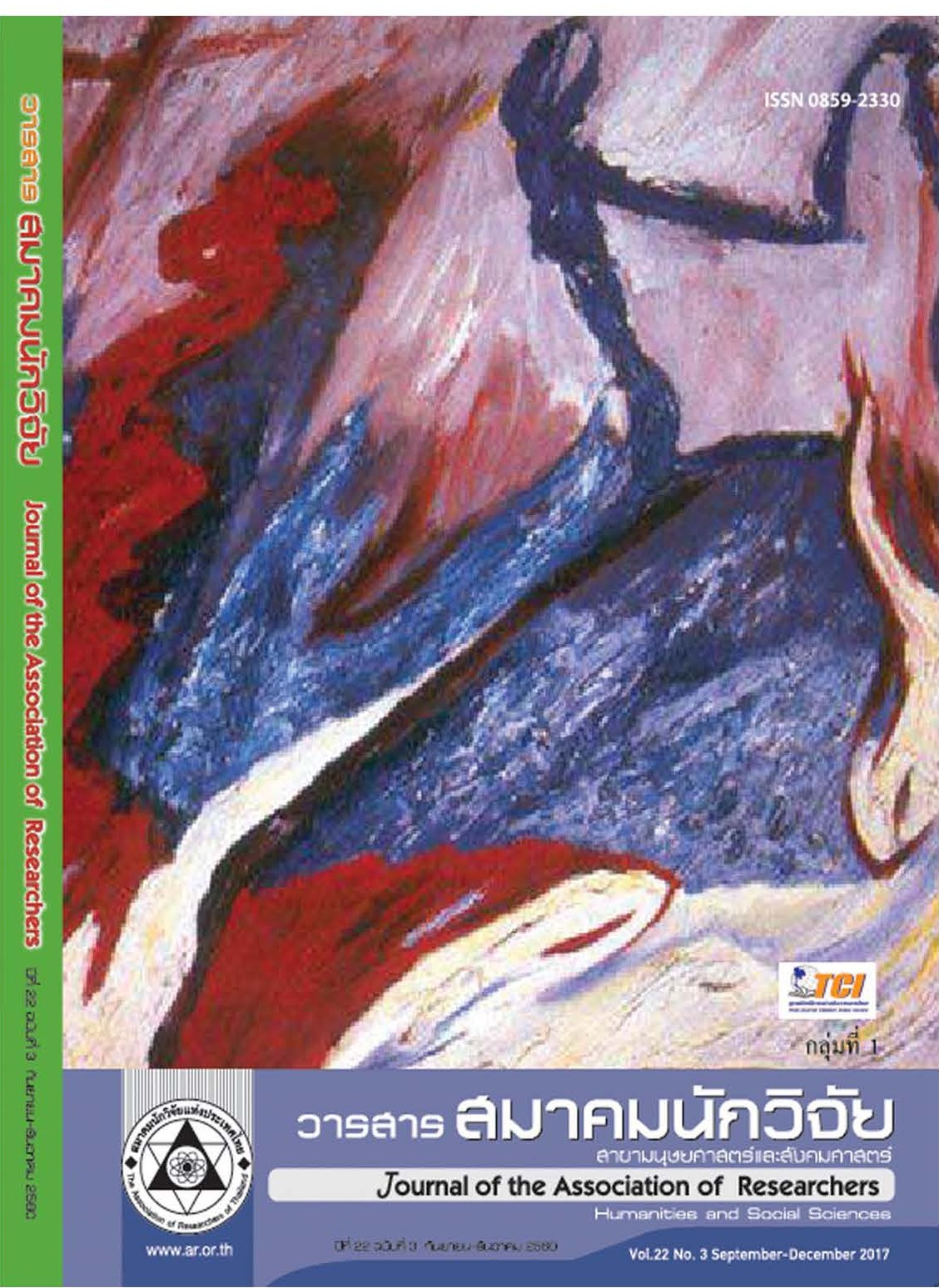The Development of Thai Ladies's Professional Golf in Thailand
Main Article Content
Abstract
In this research, “The Development of Thai Lady Professional Golfer" focuses on the following objectives 1) to study the development trends toward building success for Thai lady professional golfers, 2) to analyze factors leading to the success of Thai lady professional golfers, and 3) to distinguish the level of success between different Thai lady professional golfers. The research will be carried out as a qualitative study using in-depth interviews and both participant and non-participant observation from 5 Thai lady professional golfers, who will be treated as the main sources of research information as well as having 30 relevant persons as additional information providers to ensure the reliability of the data collection. Research instruments used in data collecting included the researcher, structured in-depth interview questions, a voice recorder, a notebook, and a camera. The study result showed that crucial factors that influence the development of success of Thai lady professional golfers are training, talent, communication, physical health, mentality, emotions, psychological counselor, coach/ advisor, sports science, private supports, and family support. The study also found that public support does not contribute to the success of professional golf players. There is no concrete policy from public sectors to support the development towards the success of Thai lady professional golfers. Instead, players' family support was the main lead to the success, which comes as the aspects of financial benefits and the gaining of reputation to the country; where public sectors/ country would advantage from the "civil state". Suggestions: Public sectors should realize the importance of building and developing the success of Thai professional golf players.
Article Details
บทความที่ปรากฏในวารสารนี้ เป็นความรับผิดชอบของผู้เขียน ซึ่งสมาคมนักวิจัยไม่จำเป็นต้องเห็นด้วยเสมอไป การนำเสนอผลงานวิจัยและบทความในวารสารนี้ไปเผยแพร่สามารถกระทำได้ โดยระบุแหล่งอ้างอิงจาก "วารสารสมาคมนักวิจัย"
References
จิรศักดิ์ จิยะนันทน์ และคณะ (2545). องค์การและการจัดการฉบับสมบูรณ์, กรุงเทพฯ: ธรรมสาร
ฉัตรตระกูล ปานอุทัย และคณะ. (2554). การสร้างแบบประเมินความสามารถในการเป็นนักกีฬากอล์ฟเยาวชนสมัครเล่น วารสารวิทยาศาสตร์และเทคโนโลยีการกีฬา, 11(1), 102 203
ชัยอนันต์ สมุทวณิช. (2541). ประชารัฐกับการเปลี่ยนแปลง. สถาบันนโยบายศึกษากรุงเทพฯ: สํานักพิมพ์แห่งจุฬาลงกรณ์ มหาวิทยาลัย,
ปฐม มณีโรจน์ และ อุมาหฤทัย วรรณศรี. (2554). สาธารณคดี: ภาครัฐในมุมมองของกฎหมายการเมือง และการบริหาร กรุงเทพฯ: สํานักพิมพ์สุภาพรการพิมพ์
บุญธรรม ก็จปรีดาบริสุทธิ์. (2551). คู่มือการวิจัย: การเขียนรายงานการวิจัยและวิทยานิพนธ์, พิมพ์ครั้งที่ 2. กรุงเทพฯ มหาวิทยาลัยมหิดล.
วรเดช จันทรศร. (2555), ปรัชญาของการบริหารภาครัฐแนวใหม่: ทฤษฎี องค์ความรู้ และการปฏิรูป กรุงเทพมหานคร ห้างหุ้นจํากัดสหายบล็อกและการพิมพ์
อดิเรก เยี่ยมบุญญะ. (2555), ประสิทธิผลการบริหารการท่องเที่ยวแห่งประเทศไทย: กรณีการส่งเสริมกีฬากอล์ฟ วิทยานิพนธ์ปริญญาดุษฎีบัณฑิต, มหาวิทยาลัยราชภัฏวไลยอลงกรณ์
Aitken, Vicki J. (1999). Match Play and Stroke Play Myths: Do Elite Amateur Golfers Play the Course or the Person. Sciences and Golf 3. Illinois: Human Kinetics.
Ames, C., & Archer, J. (1987). Mothers' Beliefs About the Role of Ability and Effort in School Learning. Journal of Educational Psychology, 79 (4): 409-414.
Bateman, T. S., & Snell, S. A. (1999). Management Building Competitive Advantage (4th ed.). Boston: Irwin McGraw-Hill.
Brides, J., & Roquemore, L. (2001). Management: Building a competitive advantage (4th ed.). ESM Books.
Caplan, G. (1976). Support systems and community mental health. New York: Behavioral Publication. Chalofsky, N. (2003). An emerging construct for meaningful work. Journal of Human Resources Development International, 6(1), 69 - 83.
Dunn, John G.H.; & Dunn, Janice Causgrove. (1999). Goal Orientations, Perceptions of Aggression, and Sportspersonship in Elite Male Youth Ice Hockey Players. Journal of The Sport Psychologist, 13(2), 183-2000,
Gottlieb, B. H. (1978). The development and application of a classification scheme of informal helping behaviors. Canadian Journal of Behavioural Science, 10(2), 105-115.
Gill, D. (2000). Psychological Dynamics of Sport and Exercise. Illinois: Human Kinetics. Heider, Fritz. (1958). The Psychology of interpersonal Relations. New York: Wiley. House, J. S. (1981). Work stress and social support. MA: Addison-Wesley.
Holt, Nicholas L.; et al. (2009). Youth Sports Parenting Styles and Practices. Journal of Sport and Exercise Psychology. 31(3), 37-59.
Jiyanan Jirasak. (2002). Organization and Management (Complete Issue). Bangkok: Thammasat. (in Thai).
Kitpreedaborisut Boontham. (2008). Handbook: Writing of Research and Dissertation (0th edition). Bangkok: Mahidol University. (in Thai).
Maneeroj Prathom and Wannasri Umaharuethai. (2011). Public case: Law Politics and management. Bangkok: Supapornkarnpim. (in Thai).
Maslow, Abraham. (1970). Motivation and Personality. New York: Harper and Row Publishers.
McClelland David.C. (1973). Testing for Competency rather than for Intelligence. American Psychologist, 28(2),1-24
Panther Chattakul., Et al. (2001). The construction of performance assessment form for amateur golfers.Journal of Sports Science and Technology (SST), 11(1), 192-203. (in Thai).
Pensgaard, A.M.; Roberts, G.C. Elite Athletes's Experiences of the Motivation Climate: The Coach Matters. Scandinavian Journal of Medicine & Science in Sports. 12(3), 54-59.
Pilisuk, M. (1982). Delivery of social support: Social innovation. American Journal Orthopsychiatry, 52(2), 20-28.
Pithapornchaikul unit (2006). Goal Orientation Influenced for Participated in the Thailand University Games of the intercollegiate Athletes Motivation. The thesis of Doctor Degree. (in Thai).
Roberts, Glyn C. (2003). Motivation in Sport: Understanding and Enhancing the Motivation and Achievement of Children. In R.N. Singer, M. Murphey, & L.K. Tennant (Eds.), Handbook of Sport Psychology issues (pp. 239-252).
New Your: Macmillan. Roger Buckley & Jim Caple. (2009). The Theory and Practice of Training (6th Edition). London and Philadelphia: Kogan page.
Steven R. Covey. (2013). The 7 Habits of Highly Effective People: Powerful Lessons in Personal Change. New York: Harcourt Brace Jovanovich, Inc.
Stone, D.N., Deci, E. L., & Ryan, R. M. (2008). Beyond Talk: Creating Anonymous Motivation Through Self-Determination Theory. The University of Kentucky.
Sumudhavanija Chai-Anan. (1998). Civil State VS Change. Academic Institution. Bangkok: Chulalongkorn University Printing House. (in Thai).
Vroom, Victor H., and Arthur G. Jago. (1988). The New Leadership: Managing Participation in Organizations. : Prentice - Hall, Inc. Yeambunya Adirek. (2012). Management Effectiveness of the Tourism Authority of Thailand: The Promotion of Golf. Journal of Valaya Alongkorn Rajabhat University, 7(3), 238-249. (in Thai).


